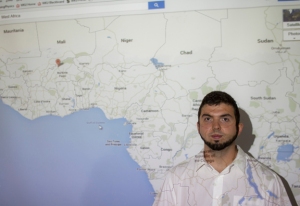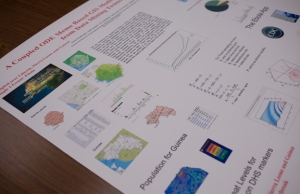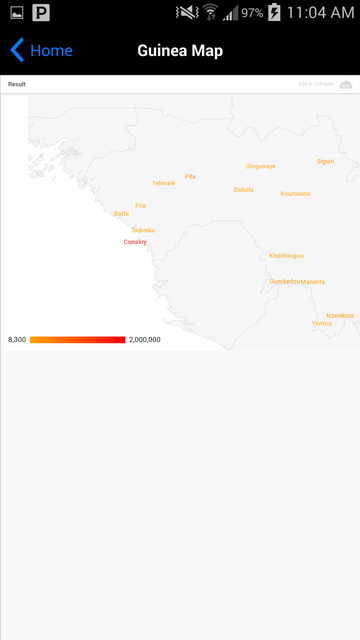Ogden News
WKU student develops The Ebola Project app to track virus
- Thursday, September 11th, 2014
A WKU graduate student has developed a smartphone app that uses Twitter data to track the outbreak of the Ebola virus and could predict the spread of the virus.

Armin Smailhodzic developed The Ebola Project app as part of his master’s thesis in Homeland Security in WKU’s Department of Physics and Astronomy. (WKU photo by Bryan Lemon)
Armin Smailhodzic of Bowling Green began working on The Ebola Project app as part of his master’s thesis in the Homeland Security program in WKU’s Department of Physics and Astronomy.
Smailhodzic’s original idea was to track Twitter data in Arabic to gather information about political unrest in the Middle East. But Dr. Cathleen Webb, head of WKU’s Department of Chemistry and Associate Dean for Research in Ogden College of Science and Engineering, asked if he could use the idea to track Ebola.
“Surprisingly enough, we found there was a lot of information being shared on Twitter,” said Smailhodzic, who received his bachelor’s degree in physics from WKU in 2011.
“People in the rural villages of West Africa may fear Western doctors, but people tweet. And that’s amazing,” said Dr. Keith Andrew, head of WKU’s Department of Physics and Astronomy and Smailhodzic’s faculty mentor.
They began the project trying to geolocate tweets in different languages and to determine whether the tweets were coming from West African nations.
“The biggest challenge with this was determining if data was really coming from those regions or if people were just talking about that region,” Smailhodzic said. “This is where we decided to use key phrases instead of a key term. We went from just searching for tweets on ‘ebola’ to ‘ebola plus the country of interest’ to ‘country of interest plus ebola plus death or deaths’ to get more specific search results. After adjusting search criteria within the software and looking at results, we were able to identify some of the Twitter users. Most of these appeared to be doctors or other aid workers sent to the region to provide assistance.”
Smailhodzic, a native of Bosnia who speaks five languages, had to learn a sixth language – Javascript – to develop the app.
The Ebola Project app includes information about the virus for travelers (preventative measures, diagnosis, treatment), interactive maps, information from the Centers for Disease Control, links to media reports and a Twitter feed on Ebola alerts.
“One goal with analyzing the data is being able to predict the spread of the virus and how long it will take to spread,” Smailhodzic said.
Their data analysis thus far shows predictive modeling is working. “With the current data we feel that the virus will spread along the West African coastline, which was confirmed this week with the first case and death confirmation in Senegal, just north of Guinea,” he said.

WKU student Armin Smailhodzic presented his research recently at a statewide conference.
The Ebola Project app is available in the App Store for IOS and the Google store for Android devices. The application also includes a contact us tab that allows users to send suggestions on how to improve the application or to ask questions. By purchasing the app, users can support further research.
Others assisting in the project have included Dr. Philip Womble (professor Physics and Astronomy) and Dr. Lance Hahn (associate professor of Psychological Sciences) at WKU’s Cyber Defense Laboratory. Former student Christopher Wright’s master’s thesis on tweet tracking also proved beneficial, Dr. Andrew said.
Smailhodzic presented a poster on the project Sept. 5 at the Kentucky Innovation and Entrepreneurship Conference in Louisville.
Smailhodzic and Dr. Andrew already are looking at the potential of modifying the app to track other viruses, such as the childhood respiratory illness in the U.S. or the Chikungunya virus in the Caribbean.
Contact: Keith Andrew, (270) 745-4357.
Some of the links on this page may require additional software to view.


